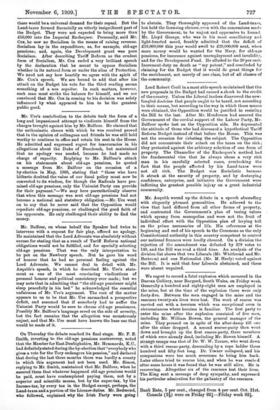On Thursday the debate reached its final stage. Mr. F.
E. Smith, reverting to the old-age pensions controversy, noted that the Member for East Denbighshire, Mr. Hemmerde, had definitely stated during the by-election that "everybody who gives a vote for the Tory endangers his pension," and declared that during the last three months there was hardly a county in which this argument had not been used. Mr. Simon, replying to Mr. Smith, maintained that Mr. Balfour, when he assured them that whatever happened old-age pensions would be paid, must have contemplated paying them, not by a superior and scientific means, but by the super-tax, by the Income-tax, by every tax in the Budget except, perhaps, the Land-taxes and a portion of the License-duties. Mr. Redmond, who followed, explained why the Irish Party were going
to abstain. They thoroughly approved of the Land-taxes, but held the licensing clauses, even with the concessions made by the Government, to be unjust and oppressive to Ireand. Mr. Lloyd George, who was in his most conciliatory and light-hearted mood, frankly admitted that the deficit of 216,000,000 this year would swell to 220,000,000 next, when more money would be wanted for the Navy, for old-age pensions, for insurance against unemployment and invalidity, and for the Development Fund. Ile alluded to the 20 per cent. Increment-duty on death as "my patent," and concluded by claiming for the Budget that it would do great things for the enrichment, not merely of one class, but of all classes of the community.






























































 Previous page
Previous page